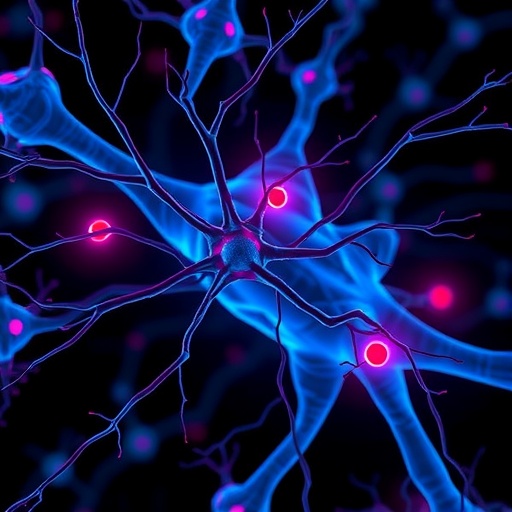Groundbreaking research from The University of Texas MD Anderson Cancer Center has illuminated a previously uncharted mechanism through which cancer cells dismantle the protective myelin sheath surrounding nerve fibers, instigating nerve injury. This nerve damage subsequently triggers a chronic inflammatory state that contributes to immune exhaustion, ultimately culminating in resistance to immunotherapy—a treatment modality crucial for many cancer patients. These novel insights into the tumor-neuro-immune crosstalk reveal a complex interplay that could redefine therapeutic strategies against various cancers.
The study, recently published in the prestigious journal Nature, represents a paradigm shift in understanding how the nervous system’s involvement in cancer progression influences therapeutic outcomes. Perineural invasion, the process by which tumors infiltrate and invade the spatial microenvironment around nerves, is widely recognized as a poor prognostic factor in numerous malignancies. However, the immunological consequences of this invasion, particularly its role in modulating immune cells within the tumor microenvironment, have remained elusive until now.
By employing a sophisticated combination of spatial transcriptomics, bioinformatics, and advanced genetic profiling on trial samples from patients with squamous cell carcinoma, melanoma, and stomach cancer, the interdisciplinary team uncovered that cancer cells actively degrade the myelin sheath. The myelin sheath acts as a critical insulator for nerve fibers, facilitating rapid signal transmission. Its destruction initiates a nerve injury response characterized by a regenerative inflammatory process that, paradoxically, becomes maladaptive over time.
This maladaptive, chronic inflammation operates through a feedback loop wherein the continuous nerve damage signals recruit immune cells to the tumor microenvironment. These immune cells, initially mobilized for repair, gradually become functionally exhausted due to persistent inflammatory stimuli. The exhausted immune landscape fosters an immunosuppressive environment, effectively shielding tumors from immunotherapeutic agents designed to reactivate the immune system’s antitumor response.
Dr. Moran Amit, M.D., Ph.D., a leading figure in Head and Neck Surgery and co-corresponding author of the study, emphasized the transformative potential of these findings. “Understanding the tumor-neuro-immune axis opens therapeutic avenues to disrupt this harmful cycle of nerve injury and immune exhaustion,” Amit stated. “By intervening in this pathway, we can potentially restore immune competency and overcome immunotherapy resistance, offering renewed hope for patients with cancers notorious for poor response rates.”
The implications of this research extend beyond the immediate tumor microenvironment to the burgeoning field of cancer neuroscience, which explores the bidirectional interactions between malignancies and the nervous system. The study’s findings highlight the myelin sheath—and the nerves it protects—as key players in modulating immune behavior in tumors, underscoring the necessity of integrating neurobiological perspectives into cancer treatment paradigms.
Mechanistically, the research identified critical signaling pathways activated upon myelin degradation, leading to recruitment of immunosuppressive cells such as myeloid-derived suppressor cells (MDSCs) and regulatory T cells (Tregs). These cells not only dampen cytotoxic T lymphocyte activity but also secrete factors that promote tumor growth and survival. Targeting these pathways pharmacologically—either by inhibiting the enzymes responsible for myelin breakdown or by blocking downstream inflammatory mediators—demonstrated reversal of immune exhaustion in preclinical models.
Moreover, the intersection of perineural invasion with immune dysfunction suggests that nerve-associated tumor niches represent unique microenvironments wherein cancer cells evade immune surveillance. This spatially localized view challenges the traditional immune-oncology model that predominantly considers tumors as homogenous masses, advocating instead for a microanatomical and molecularly nuanced approach.
Collaboration across multiple leading institutions—including Brigham and Women’s Hospital, the University of Michigan, Moffitt Cancer Center, and Queens University—fortified the study’s robustness, allowing for the integration of diverse patient samples and cutting-edge technological expertise. The James P. Allison Institute for Immunotherapy played a pivotal role in facilitating immunological assessments, supporting the identification of precise immune phenotypes associated with nerve injury.
The research also carries clinical ramifications, particularly the prospect of developing biomarkers indicative of nerve injury-mediated immunosuppression that could stratify patients most likely to benefit from therapies targeting this axis. Incorporating such biomarkers could refine patient selection for immunotherapy, minimizing ineffective treatment exposure and associated toxicities.
Importantly, MD Anderson’s Cancer Neuroscience Program continues to explore how nervous system perturbations influence cancer biology and patient experiences throughout the disease continuum. This multidisciplinary endeavor weaves together neurobiology, oncology, and immunology, striving to translate molecular discoveries into tangible clinical advancements.
In summary, this seminal study uncovers how cancer-induced myelin breakdown initiates chronic nerve inflammation that exhausts the immune system and thwarts immunotherapy efficacy. By elucidating this pathway, the work paves the way for novel therapeutic interventions aimed at preserving nerve integrity and reinvigorating antitumor immunity. As cancer neuroscience emerges as a critical frontier, targeting the tumor-nerve-immune axis may well become a cornerstone of future cancer treatment strategies.
Subject of Research: Cancer neuroscience focusing on tumor-induced nerve injury and its role in immunotherapy resistance.
Article Title: Cancer cells dismantle protective nerve coverings to drive immune exhaustion and immunotherapy resistance
News Publication Date: August 20, 2025
Web References:
- MD Anderson Cancer Center Immunotherapy: https://www.mdanderson.org/treatment-options/immunotherapy.html
- MD Anderson Cancer Neuroscience Program: https://www.mdanderson.org/research/departments-labs-institutes/programs-centers/cancer-neuroscience-program.html
- Nature Article: https://www.nature.com/articles/s41586-025-09370-8
Image Credits: The University of Texas MD Anderson Cancer Center
Keywords: Cancer immunotherapy, nerve injuries, cancer treatments, immunotherapy, neuroscience, cancer cells, nerve tissue, nervous system, myelin sheath, nerve fibers




